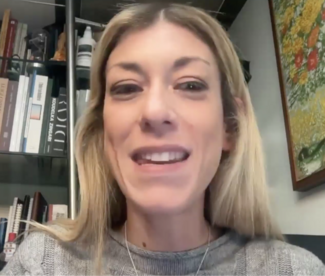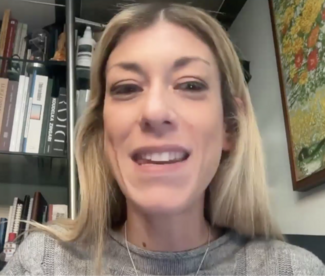Amivantamab Rechallenge for Patients With Left-Sided Metastatic Colorectal Cancer
Dirk Arnold, MD, PhD, Asklepios Tumorzentrum Hamburg, Hamburg, Germany, discusses updated results from the OrigAMI-1 trial, which assessed amivantamab rechallenge in patients with left-sided RAS/BRAF wild-type metastatic colorectal cancer (mCRC) who experienced disease progression after treatment with an EGFR inhibitor.
Results demonstrated that amivantamab rechallenge showed promising antitumor activity and lengthened survival end points among patients who underwent rechallenge at least 9 months after EGFR inhibitor treatment.
These data were presented at ESMO Gastrointestinal Cancers Congress in Barcelona, Spain.
Transcript:
Hello dear colleagues, my name is Dirk Arnold, I'm a professor of medical oncology working at the Asklepios Tumorzentrum in Hamburg, Germany, and I took the privilege to introduce you a bit to OrigAMI-1 which is a phase 1/2 trial in refractory colorectal cancer patients looking on the efficacy of amivantamab.
So, what we are looking for? Amivantamab is a free functional bispecific monoclonal antibody targeting the EGF receptor, anti-EGFR, then also targeting the MET receptor, being anti-MET. It also has a specifically designed FC fragment which binds immune cells with a high affinity, therefore it's B functional, or free functional B modal. Where was amivantamab examined in colorectal cancer? Well, it was done in various combinations in the OrigAMI-1 trial in patients which had refractory colorectal cancer and patients which were RAS wild-type and, specifically to the cohort which I'm referring to, also left-sided and also [BRAF-V600E] wild-type.
OrigAMI-1, as I told before, it's a basket trial that has many different subgroups and I'm specifically referring to data of cohort B. Cohort B are patients which already underwent treatment with anti-EGFR antibody and became resistant to this treatment. We do know that reintroduction of an anti-EGFR antibody treatment may be successful. And here, in fact, we did not simply retreat this patient with an anti-EGFR antibody, they were retreated with a specific broad spectrum bispecific antibody and the goal of this examination was to see whether the half time, or half lifetime, of the resistant clones led to better or worse outcome. We do know that resistance to anti-EGFR antibody develops and also disappears, and we do know that the half lifetime of the resistant clones is about 4.4 months, this has been shown in previous trials.
Fifty-four patients in this cohort B were examined whether they had a 2-time half lifetime, treatment discontinuation from first use or from first resistance of anti-EGFR of more or less the 2 half lifetimes — we'll say, of more or less than 9 months of discontinuation of the EGFR. And results were very clear. Patients which had a longer discontinuation of anti-EGFR had a way better outcome than patients which had only a short half-life time, or a shorter treatment duration, therefore there is a clear signal that the efficacy is way higher if half lifetime is longer.
Secondly, we were also looking on the relation to previous response, so whether patients which initially responded to the anti-EGFR had a higher likelihood to respond again, when amivantamab was used, and again, the same was found. But however, the relation to the two half lifetimes, we'll say 9 months or more, discontinuation from first time was a stronger signal for efficacy or a stronger predictor for efficacy than the initial response.
In summary, we have learned that amivantamab may play an important role in treatment of refractory patients with metastatic colorectal cancer which had a pretreatment also with an anti-EGFR antibody and that time from first discontinuation to retreatment is an important factor. What else have we learned? Well, amivantamab is continuously developed now also in a first line randomized phase 3 trial, as well as in a second line phase 3 trial, therefore I think we will learn much more about amivantamab in combination with chemotherapy.
Source:
Arnold D, Fernandez EE, Van Cutsem E, et al. Rechallenge with amivantamab, an EGFR-MET bispecific antibody, after disease progression on prior EGFR inhibitor in left-sided RAS/BRAF wild-type metastatic colorectal cancer: Updated results from OrigAMI-1. Presented at ESMO Gastrointestinal Cancers Congress. July 2-5, 2025. Abstract 6 MO














